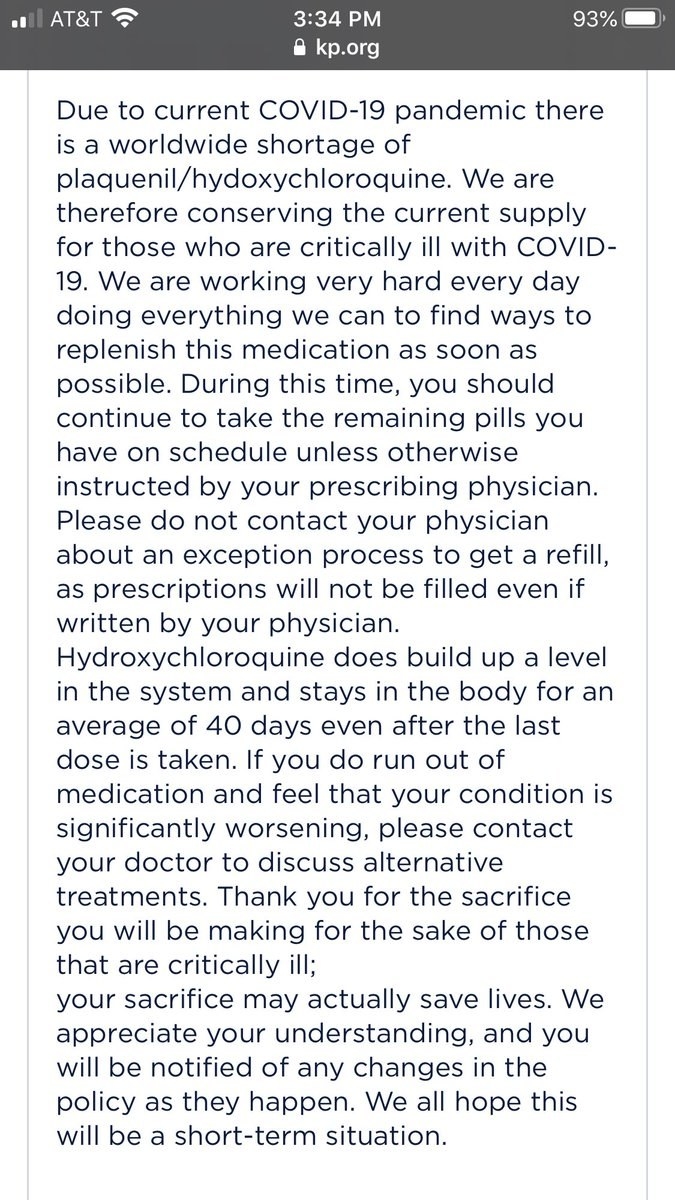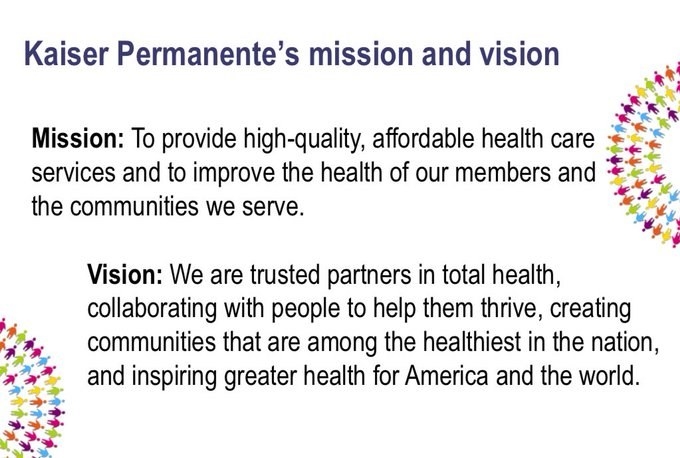 A Woman With Lupus Said Her Health Care Provider Is Stopping Her Chloroquine Prescription And Thanked Her For The “Sacrifice”
A Woman With Lupus Said Her Health Care Provider Is Stopping Her Chloroquine Prescription And Thanked Her For The “Sacrifice”
https://www.buzzfeednews.com/article/tanyachen/kaiser-permanente-lupus-chloroquine

Dale said she’s been taking the medication for a decade, and she’s scared about possible consequences to her own health during the coronavirus pandemic if she’s forced to stop taking hydroxychloroquine.
“I am already immunocompromised, and not taking this medication with likely put me into a lupus flare, making serious complications from COVID more likely,” she said.
“The fact that they thanked me for my ‘sacrifice’ is disturbing,” she then added. “I never agreed to sacrifice my health and possibly my life and cannot believe that I am being forced to do so.”
In the message Kaiser sent to her about its decision to withhold the medication, it wrote, “Please do not contact your physician about an exception process to get a refill, as prescriptions will not be filled even if written by your physician. Hydroxychloroquine does build up a level in the system that stays in the body for an average of 40 days even after the last dose is taken. If you do run out of medication and feel your condition is significantly worsening, please contact your doctor to discuss alternative treatments.”
“Thank you for the sacrifice you will be making for the sake of those that are critically ill; your sacrifice may actually save lives,” the message said.
In a statement provided to BuzzFeed News, Kaiser Permanente confirmed that it was no longer filling routine prescriptions for chloroquine.
“As we face the real possibility of running out of the drug for everybody if we don’t take steps to mitigate the shortage, Kaiser Permanente, like other health care organizations across the country, has had to take steps to control the outflow of the medication to ensure access to severely sick patients, including both COVID-19 and those with acute lupus,” said Nancy Gin, regional medical director of Quality and Clinical Analysis at Kaiser Permanente, Southern California, which has 4.6 million members.
“Extensive experience and research show that hydroxychloroquine builds up in the body and continues to work for an average of 40 days even after the last dose is taken. By then, we expect the drug manufacturers to have ramped up production to meet the increased demand. Until then, we are no longer refilling routine prescriptions to ensure we have adequate supply to care for our sickest patients,” Gin said.
“Kaiser Permanente physicians and pharmacists are also working together on an evidence-based approach to identify alternative therapies for patients with lupus,” Gin added in a follow-up statement.
Dale said she immediately called her doctor and has been scheduled for a phone call next week.
Please do not misuse hydroxychloroquine. This med is critical for people who have SLE, like me. I was told today that my prescription cannot be filled because the suppliers are completely out. Now I do not have the meds I actually need for an incurable disease I actually have. 🤬 https://t.co/dlwuWCwVZk
Despite thin evidence for the drug’s effectiveness against coronavirus infections, shortages of chloroquine have erupted since Trump called it a “game changer” at a White House news conference late last week. The drug, a derivative of an antimalarial drug, has been added to the regimen for treating COVID-19 infections in China and South Korea and is being tested in clinical trials in the US.
However, experts on drug testing have been skeptical of the evidence for its benefits. A frequently cited French study of 20 patients saw several drop out of the trial to instead go into intensive care.
An Arizona man died on Monday after self-medicating with a related drug, chloroquine phosphate, where chloroquine was also touted at White House news conferences.
“For many people with lupus there are no alternatives to these medications,” the Lupus Foundation of America said in a statement on Monday, warning of shortages. “Hydroxychloroquine or chloroquine are the only methods of preventing inflammation and disease activity that can lead to pain, disability, organ damage, and other serious illness.”
Dale, who’s been calling multiple pharmacies in her local area, said, “I have learned that all area pharmacies are completely out of hydroxychloroquine.”
“In their mission statement, Kaiser says that they aim ‘to provide high-quality, affordable health care services and to improve the health of our members and the communities we serve,'” Dale said. “How is denying medication for a chronically ill, immunocompromised patient during a pandemic improving my health?”
“I want Kaiser to follow their own mission statement and reverse the decision to withhold my medication.”
UPDATE
This story has been updated to include a follow-up statement from Kaiser Permanente.
Filed under: General Problems




















Leave it to Kaiser to decide a patient who might (as yet unproven) get better with the use of this medication is more important than a woman with lupus who’s been taking it for 10 years with positive results! Way to lower patient costs at her expense!!